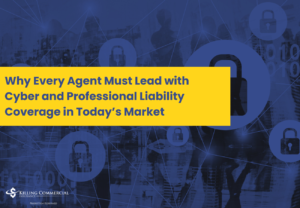The Cyber Coverage Gap: Why Middle Market Businesses—and Their Agents—Can’t Afford to Ignore It

Cyber liability insurance has long hovered on the periphery of commercial insurance conversations—often dismissed as irrelevant or optional. But in today’s digital-first business environment, that oversight has become a ticking time bomb, especially in the middle market. Contractors, manufacturers, professional services, and even nonprofits are increasingly being targeted by cybercriminals. Yet many agents still don’t bring it up. And when they do, it’s often an afterthought.
Let’s be clear: Cyber is no longer optional. It’s essential—and failing to address it can lead to significant exposure for both clients and the agents who serve them.
Why Cyber Insurance Belongs at the Front of the Conversation
Cyber insurance is not just for tech companies or online retailers. It’s now a core component of a sound risk management strategy for almost every business.
As an agent, if you’re not leading with cyber, you’re not just missing a sales opportunity—you’re leaving the door wide open for E&O claims. More and more, agencies are being sued for failing to advise clients on cyber risk. It’s become one of the “Four Horsemen” of E&O risk (alongside flood, umbrella, and EPLI), and ignoring it could cost you dearly.
Clients assume you’ll protect them. If you don’t bring up a coverage they clearly need—like cyber—and they later experience a breach, guess who they blame? Not the hackers. You.
Exposing the Myths: Why Every Industry Has Cyber Risk
Many industries are operating under the false belief that they’re immune to cyber threats. Contractors and manufacturers are notorious for this.
The most common objection? “We don’t store sensitive data.”
That misses the point entirely.
Contractors routinely send and receive large invoices and wire payments—perfect targets for invoice manipulation and social engineering. Manufacturers rely on third-party vendors and highly automated systems. One ransomware event can shut down a production floor, leading to devastating losses. The exposure is real, even if they’re not holding credit card numbers or health records.
This misunderstanding is why cyber insurance is often skipped: not because the risk isn’t there, but because it isn’t understood.
From Order-Taker to Risk Advisor: Leading with Cyber Liability

Offering cyber insurance isn’t enough. Today’s top producers are educating their clients, asking better questions, and turning uncertainty into confidence.
Start by discussing the flow of money in the client’s business:
- “How do you pay your vendors?”
- “Do you send wires or use ACH?”
- “Do you have staff managing vendor relationships electronically?”
These questions uncover vulnerabilities without directly “selling” coverage. They also drive doubt in the incumbent agent. If no one has ever asked these things before, your prospect is already wondering: What else has my current agent missed?
You don’t have to trash the competition. Let the questions do the work.
Tools That Close: Coverage Comparisons and Risk Assessments
One of the most powerful tools at your disposal is the coverage comparison. When done right, this shows—at a glance—how cyber policies differ by carrier in areas like:
- Funds transfer fraud
- Invoice manipulation
- Social engineering
- Dependent business interruption
- Privacy liability
- Ransomware recovery
Platforms like ProWriters don’t just provide quotes—they deliver a visual grid of coverage limits and sublimits across top carriers. This comparison makes the conversation easier and helps clients see the gaps in coverage for themselves.
Pair that with a vulnerability assessment (many carriers provide these automatically at the quoting stage), and you’ve got a powerful sales tool. When clients see their digital weak points on paper, it’s hard to ignore.
Beyond the BOP: The Danger of Tacking On Coverage
A common mistake? Assuming that the cyber endorsement on a BOP is sufficient.
It’s not.
These BOP add-ons are often severely limited in scope. They may exclude key perils like social engineering or dependent business interruption, have tiny sublimits, or exclude coverage for claims involving vendors. Worse yet, most agents only find out the hard way—after a claim is denied.
If you’re quoting cyber, quote a standalone policy from a cyber specialist. The difference in claims response is night and day.
The Power of Partnerships: MSPs, Panels, and Digital Campaigns

You don’t have to go it alone.
Partner with local managed service providers (MSPs) who manage IT security for dozens—sometimes hundreds—of businesses. These professionals often witness breaches firsthand and can refer business your way if you position yourself as the cyber-savvy agent.
Another effective tactic? Host a cyber liability webinar or lunch-and-learn. Bring in a cyber underwriter, a breach attorney, an MSP, or even local law enforcement to build a panel. Record the event and turn it into evergreen content you can repurpose for:
- Blog posts
- Reels and shorts
- Automated email campaigns
- Gated landing pages for lead generation
Make your ProWriters quote link or iframe form available directly on your website to generate inbound leads while prospects watch your educational content.
Limitations on Limits: How to Approach Cyber Insurance Limits
How much cyber coverage is enough?
That’s a tricky question, and the answer isn’t one-size-fits-all.
Many agents default to $1M in coverage, not because it’s the right amount, but because it’s “standard.” But the risks vary wildly depending on revenue, operations, and technology exposure.
Tools like:
- CyberCube (advanced and enterprise-level)
- Coalition’s benchmarking reports
- At-Bay’s free cyber risk calculator
…can help you estimate potential losses from ransomware or business interruption.
A good rule of thumb? Consider:
- Projected lost income from 2-4 weeks of downtime
- Potential invoice manipulation or funds transfer fraud
- Recovery costs (including data forensics and breach notifications)
- Defense and regulatory penalties in case of litigation or compliance violations
Then, stack your policy accordingly. Many carriers offer sublimits for different categories—and some even include “clawback” features that help recover stolen funds if reported quickly.
What Top Producers Are Doing Differently
If you want to move from average to exceptional, here’s what the top 10% of producers are doing right now:
- Quoting cyber on every renewal, even when clients don’t ask
- Documenting rejections every year (not just once)
- Educating themselves through tools like Cyber U
- Sending pre-renewal quote packets with coverage comparisons
- Running vulnerability scans to elevate the conversation
- Using co-branded marketing videos by industry (e.g., construction, manufacturing)
- Setting up digital quoting pages on their websites to drive leads
They’re not just protecting their book—they’re growing it.
Final Thoughts: The Time to Lead with Cyber Is Now
Cyber risk isn’t going away. If anything, it’s getting worse—fueled by AI-powered attacks, human error, and a rapidly digitizing business world.
You have two choices as a producer:
- Wait until your client has a claim and hope they don’t blame you.
- Lead the conversation now, offer the coverage, and document everything.
The second option isn’t just the right one—it’s also the most profitable.
Middle market businesses are hungry for real advisors, not order-takers. And if you’re equipped with the right tools, the right message, and the right mindset, you can be the difference-maker in their protection—and your own growth.

From Imposter Syndrome to Intentional Growth: How Producers Win by Controlling Time, Trust, and the Submission Process
The commercial insurance world isn’t for the faint of heart. It’s unpredictable, chaotic, and constantly demanding producers to manage competing pressures—client needs, renewal deadlines, life events, prospecting goals, and agency responsibilities. And if you’re a middle-market producer, multiply that by ten.

Why Every Agent Must Lead with Cyber and Professional Liability Coverage in Today’s Market
In the middle market commercial insurance space, the role of the producer has never been more critical—or more misunderstood. Too many producers still view their job as selling policies instead of what it truly is: protecting the assets and livelihoods of the businesses they serve.

Why Niching Down Is the Fastest Way to Win Middle Market Commercial Insurance Accounts
The middle market rewards depth, not breadth. Yet many producers still approach it like a volume game, quoting everything that moves, chasing price, and hoping activity turns into production. From the outside, it looks like hustle. From the inside of the underwriting and wholesale world, it looks like noise.

Turning Homeowners Into Referral Engines: How Homebot Helps Insurance Agencies Win Personal Lines Through Automation, Relationship Equity, and Real Estate Synergy
Personal lines has quietly become one of the most competitive segments in the insurance industry. Agencies that once dominated their local markets are now fighting to differentiate themselves against direct writers, digital-first carriers, and large brokers with massive content machines.

Why the Soft Cyber Market Is Your Best Opportunity: Protecting Clients, Managing Risk, and Driving Revenue
The cyber insurance market has always been unpredictable. Over the past decade, we’ve seen it move from an emerging line of coverage to one of the most volatile, swinging rapidly between soft and hard market cycles. But today, cyber has entered one of the softest markets in recent memory—and that presents a rare opportunity for both agents and clients.

Captives Have Moved Downstream: Why Middle-Market Producers Must Master the Conversation—Or Get Left Behind
For most of my 20-year career, captives felt like something reserved for the insurance elite—the jumbo accounts, the Fortune-level operations, the companies with multimillion-dollar manual premiums and entire departments dedicated to risk management. If you had asked me ten or fifteen years ago whether a $250,000 account was a legitimate captive candidate, I would’ve laughed. I thought captives were reserved for companies so complex and so large that the only rational way to insure them was to build an insurance company around their risk.

Responses